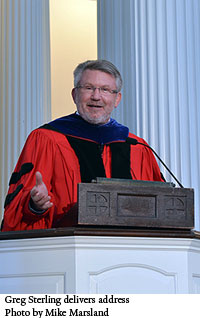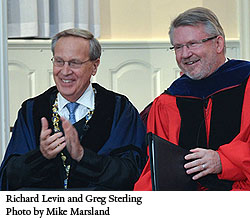Yale University President Richard C. Levin installed Gregory E. Sterling as the fourteenth dean of Yale Divinity School on Oct. 23 during ceremonies in a packed Marquand Chapel attended by current YDS faculty, students, Yale administrators, retired faculty, alumni, former colleagues of Sterling, and many others.
 In turning over the deanship to Sterling, Levin referred to the “powerful and enduring mission of Yale Divinity School” and said, “We entrust the stewardship of the school to this outstanding scholar and committed churchman who has already demonstrated, as dean of the Graduate School at Notre Dame, exceptional leadership and creativity.”
In turning over the deanship to Sterling, Levin referred to the “powerful and enduring mission of Yale Divinity School” and said, “We entrust the stewardship of the school to this outstanding scholar and committed churchman who has already demonstrated, as dean of the Graduate School at Notre Dame, exceptional leadership and creativity.”
Before arriving at Yale Divinity School, Sterling spent more than two decades at the University of Notre Dame, where he served in several capacities at the College of Arts and Letters prior to becoming the first dean of the independent Graduate School.
A New Testament scholar with a specialty in Hellenistic Judaism, Sterling officially began his five-year term as dean on Aug. 1, succeeding Harold W. Attridge. The installation was primarily the public and ceremonial capstone to his selection as dean, which was announced on March 1. He holds the titles The Reverend Henry L. Slack Dean of Yale Divinity School and Lillian Claus Professor of New Testament.
A central component to the installation was the address delivered by Sterling after the official “act of installation” by Levin and an “affirmation” offered by Holmes Professor of Old Testament Criticism and Interpretation John Collins, who was chair of the search committee for a new dean.
Collins offered a few light-hearted words of encouragement before Sterling spoke but ended by saying, “I hope you will explain that while many parts of the university should be concerned with values, it is our raison d’etre. While we do provide professional training for ministry and preparation for further academic study, our main business is to foster the understanding of religion and its place in society, in the hope that religion can bring people together, and not divide us, as it so often does in contemporary society… . We do hope that you will on occasion find a prophetic voice to remind us of what we should really be about.”
In his address, entitled “The Mystery of God: Reimagining the Church in the Twenty-First Century,” Sterling melded his thoughts as administrator, person of faith, and scholar—those of a New Testament scholar in particular—and set out some ideas about how he hopes to lead the school during his tenure as dean.
Like the ancient interpreter of Jewish Scriptures Philo of Alexandria, Sterling said, he did not begin his career with administrative aspirations but, like Philo, found himself drawn into the administrative realm.
As a scholar, said Sterling, he is “enamored with the life of the mind and the freedom it affords to reflect on the texts that mean so much to me.”
“My own way of contrasting life as a faculty member with my life as a dean,” he quipped, “is to say that I was once paid to do what I love to do and now I earn my living.” But he added, “Let me be clear: I consider the deanship of Yale Divinity School the highest honor of my life.”
 Drawing on Ephesians, Sterling deconstructed the text to show how the author of the letter, described by Sterling as Deutero-Pauline, was able to “build an understanding of the church that was both faithful to the vision of Paul and at the same time extended that vision well beyond what the Apostle had imagined.”
Drawing on Ephesians, Sterling deconstructed the text to show how the author of the letter, described by Sterling as Deutero-Pauline, was able to “build an understanding of the church that was both faithful to the vision of Paul and at the same time extended that vision well beyond what the Apostle had imagined.”
Sterling said that, just as the author of Ephesians extended the Apostle Paul’s writings, he hopes to draw faithfully, creatively, and prayerfully on the history and traditions of YDS in ways that are responsive to the seismic shifts in the religious landscape of the 21st century. He cited several: the decline of mainline Christian churches that have supported YDS for decades and centuries by sending ministerial students to YDS for their training; the shifting of the geographic center of Christianity southward to Africa and Latin America; the demands of globalization, including the need to listen closely to people of non-Christian faiths.
Sterling concluded, “There is an urgent need to think about theology and the church afresh. We should not and must not begin de novo; we must begin just as the author of Ephesians began with the sources that have shaped our identity. We cannot, however, simply repeat those sources or our interpretations of them. The world has changed and so must we.”
Click here to read more about the selection of Sterling as dean. More photos of the installation are available on the YDS Facebook page by clicking here. Click here to view a video of the ceremony.
As dean, Sterling has a number of areas of particular interest, including, among others, ecumenical and interfaith relations, the strengthening of the mainline church tradition in American society, recruitment of faculty and students from under-represented groups, the relationship between faith and intellect, interdisciplinary approaches to learning, and forging ties with Christians in Arica and Latin America.
Like his father before him, Sterling is a minister in the Churches of Christ and for 16 of his years at Notre Dame, until 2009, he served as a part-time minister for the Warsaw Church of Christ in Warsaw, IN.
The author of several books and numerous scholarly articles and essays, Sterling has concentrated his research on the writings of Philo of Alexandria, Josephus, and Luke-Acts, with a focus on the ways in which Second Temple Jews and early Christians interacted with one another and with the Greco-Roman world. He has served on various commentary series related to early Christianity and Judaism and has held leadership positions in the Society of Biblical Literature, the Studiorum Novi Societas, and the Catholic Biblical Association.
Sterling received a B.A. from Houston Baptist University, an M.A. from Pepperdine University, a second M.A. from the University of California (Davis), and a Ph.D. from the Graduate Theological Union.
| Attachment | Size |
|---|---|
| 2.97 KB |